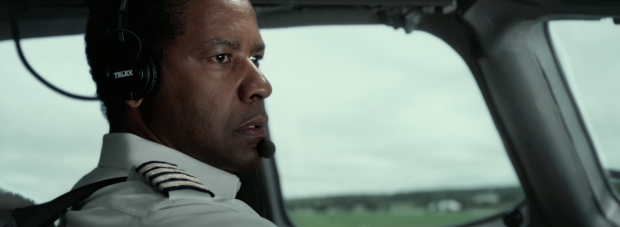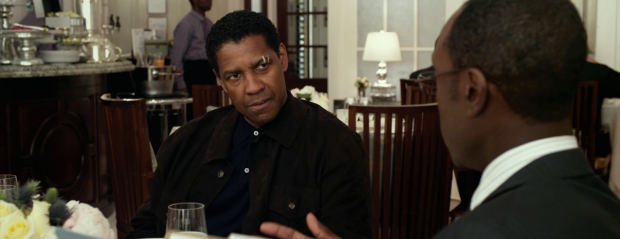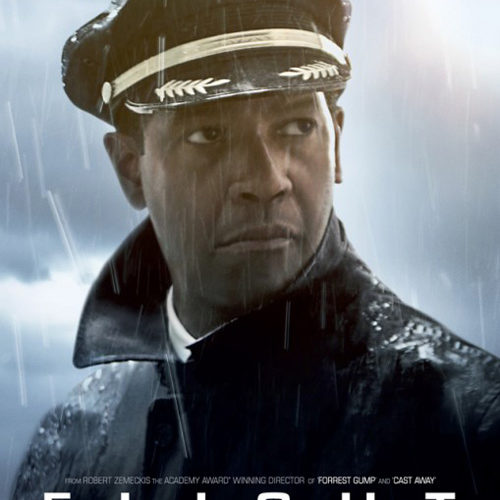In the opening scene of Robert Zemeckis’ Flight — a very promising return to live-action form for the guy who, since Cast Away, has spent a lot of time playing around with motion-capture animation — there is a carefully considered, splendidly drawn-out take that is unassumingly effective in the way it introduces us to the rarely-sober life of Whip Whitaker (Denzel Washington). It’s perhaps the subtlest shot in the entire film, and yet it gives us all the high-wire information we need. As Whip bickers with his ex-wife over the phone about tuition fees for the son he hardly ever sees, we immediately recognize the hostile family dynamics at work. As he takes a few sips of beer leftover from the previous night, we get the sense of his alcohol dependency. As he aggressively snorts a line of cocaine, the darkness of this man is taken to a new low. And as a naked Nadine Velazquez walks in and out of the frame, we’re invited to make all sorts of assumptions about Whip’s sex life — though, to be fair, he does gain some credit when we learn that Velazquez’s character is a co-worker, rather than a hooker.
What comes next is the film’s narrative catalyst. While piloting an early-morning flight, Whip encounters heavy turbulence, and he’s forced to make the kind of gutsy decision that could perhaps only be made by a man in his state (in addition to being drunk and high from his morning pick-me-ups, Whip took the additional pleasure of slyly pouring himself an in-flight screwdriver while introducing himself to his passengers). In a move that’s greeted with great skepticism by his co-pilot (Brian Geraghty), Whip inverts the plane completely, and is eventually able to land it in an open field with minimal causalities. Six people die — four passengers, two staff members — but Whip’s actions are nevertheless received as gallantly heroic, since the plane he was flying was so mechanically damaged that the fact that he salvaged any lives is a miracle in itself.

When Whip wakes up from the crash, he’s in the hospital, his left eye covered in an imposing patch and his legs unable to support himself without the aid of a walker. But moral support from two longtime friends — nice-guy Charlie Anderson (Bruce Greenwood) and the maverick, cocaine-supplying Harling Mays (an outrageously funny John Goodman) — helps bring Whip back into the light. A heavy smoker, Whip also has a key encounter in one of the hospital’s hallways. After sneaking out of his room to grab a late-night smoke, he comes across two other bruised souls — a heroin addict named Nicole (Kelly Reilly) and a near-death cancer patient played by James Badge Dale, who outright owns the movie in this single scene. (Dale pulled off a similar feat earlier this year in Joe Carnahan’s The Grey, which, coincidentally, also featured an expertly staged plane-crash sequence.) But while we only get a chance to witness Dale’s gaunt, pale cancer patient this once, Reilly’s part, as a woman who’s hit rock bottom and knows it (unlike Whip), will come to earn a vast significance.
The arrival of Don Cheadle, as a high-priced lawyer, shakes up the picture. Though working in Whip’s defense, Cheadle’s character is still wisely blunt in his presentation of the situation. Post-crash toxicology reports, he informs us, indeed confirm that Whip was massively loaded while flying the plane — an irredeemable offense that could put him behind bars for the rest of his life, if he isn’t careful with how he handles his behavior from here on out. Unfortunately, the enormous stress of the circumstances drives Whip to the bottle more than anything else, as characterized in a heartbreaking shot in which Washington essentially cries himself into a glass of vodka.
Where Flight goes from here is dark, uncompromising, and admirably motivated by the character of Whip Whitaker. As written by John Gatins, the film becomes a merciless, head-first dive into the tortured life of a sick, sick man. It’s a role that requires intense vulnerability from the assigned actor, and Washington responds with one of the most compelling and searing performances he’s ever given. There are so many memorable gestures and reflexes to note, and, impressively, a good number of them are wordless, meaning that Washington, as always, has a stare that makes you look into your own soul. A frightening example is a shot during an AA-meeting scene that holds itself on Washington’s face for an uncomfortably long amount of time. His head tilted sideways and his eyes like needle-pointed darts, it’s maybe the creepiest Whip Whitaker moment we get, and it’s a sign of how willing the film is to follow this man into the abyss he’s created for himself. There are things to like about Whip, sure, but Flight isn’t at all afraid to explore his jet-black demons.

There’s a likely chance that many viewers — especially those roped in by the “from the director of Forrest Gump!” taglines — will be turned off throughout most of the film. There’s an arguable messiness to Gatins’s screenplay — especially in its uneven (though, to my mind, moving) dedication to the Kelly Reilly character — but, even at its most unfocused, its goals are worthy of respect. While Whip’s actions largely dictate the film, there’s no slack in the volume of thematic curiosities. There are recurring religious and spiritual explorations throughout, and the overall handling of the depiction of alcoholism feels true to life, both in the performance and in the writing.
My current instincts tell me that Flight is a pretty special movie, the kind of thing I will return to again and again because of its thrilling fusion of entertainment value and character-driven complexity. The epilogue, for some, may lay on the arc-defining gestures with too much thickness, but so engrossed was I in this character and this portrayal that I found myself, against expectations, very receptive to where Whip is left at film’s end. The crucial people involved here are so committed to what they’re doing that both the journey and the destination feel tremendously earned. I’m too much of a cynic to predict any kind of word-of-mouth success for Flight amongst audiences, but I know that it’s something that will speak to me for a long time.
Flight is currently in wide release.

